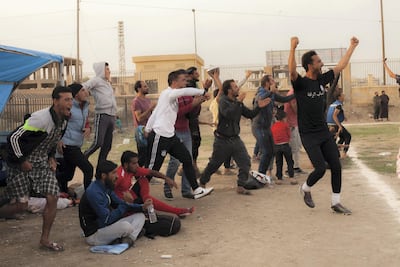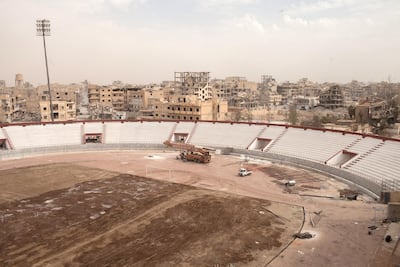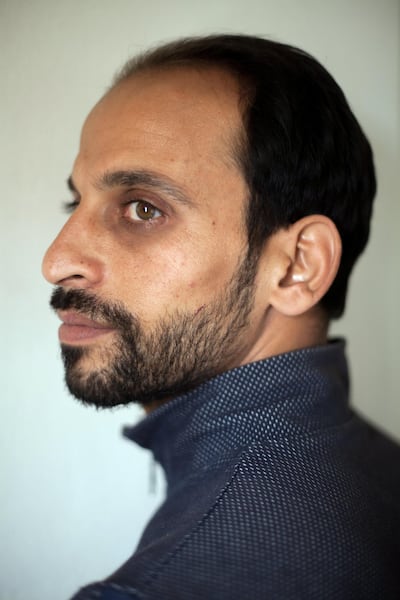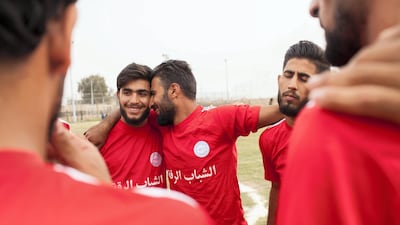Younis Al Jassem, a 30-year-old resident of the eastern Syrian city of Raqqa, is concerned. “We are ready but a bit nervous because our opponent is strong,” he says as he jumps into a yellow taxi to go to the game.
The car speeds on a dirt road roaming through the post-apocalyptic wasteland that is his city today. Mr Al Jassem is a captain – but not the military kind. The war he wages takes place on the football field.
One year after ISIS was ousted from its former self-proclaimed capital, Raqqa's Al Shabbab football team has reunited. Now, Mr Al Jassem says they are ready to take part in a new championship and show other Syrian cities they can overcome a three-year occupation.
The captain is one of the last to arrive on the football pitch, located near the Euphrates river. His teammates greet him with a large smile. “Our game has been affected by the war. Players died, others fled to Europe. Some are still missing. But we tried to rebuild our team," Mr Al Jassem, a centre-back defender, says as he ties his football boots. "For us, it is a way of escaping Raqqa's harsh reality. It's spiritual sport."
Since the US-backed Kurdish-led Syrian Democratic forces (SDF) reclaimed Raqqa from ISIS in October last year, moments of bliss have been scarce for residents of the eastern Syrian city. Much of it lies in ruins and civil defence units have the gruesome task of extracting bodies from the rubble one year later as a result of the bloody, four-month-long battle. So, for the players and a couple hundred supporters, today is no ordinary day.
For the inaugural game of the Euphrates Championship, Raqqa is pitted against Manbij, a multi-ethnic city located near the Turkish border. The ISIS occupation and shifting front lines in the battle to dislodge the militant group had disconnected these football clubs for years until now.

It’s 3:30pm, and the Syrian referee is ready to blow his whistle. He too had not seen a football pitch in a long time. Under ISIS rule, referees were forbidden because the militants believed no man should usurp the authority of God. Other ISIS-compliant rules included the banishment of the shirts of Western football teams such as Barcelona and Real Madrid – considered to be “infidels” – and players would have to abruptly end games during prayer time.
The game begins. Al Shabbab scores in the first few minutes, triggering a massive outburst of screams and laughter among their fans. But the Manbij team has come to win and quickly regains the upper-hand, scoring twice.
Hassan Mehssen, the 35-year-old Al Shabbab coach, pointed out on the eve of the game that Manbij was liberated from ISIS more than a year before Raqqa, so they “had more time to train”.
"They are more prepared than us, but we are playing at home and we have our fans with us. Hopefully we are still gonna win," he added.

At half time, Mr Mehssen looks livid. “They are good at passing the ball, but they lack defence and their goalkeeper is bad. All you need to do is focus. What is wrong with you?!" he yells at his players who have gathered around him.
A rejuvenated Al Shabbab start the second half in ruthless fashion. A penalty in their favour brings the score to a balance. Their third and final goal is welcomed with frenzy.
The crowd of fans jumps as one. They start dancing, singing and playing music with a drum. "Thank God!" a supporter yells, looking at the sky. Raqqa wins.
Al Shabbab will next play against the town of Ain Issa from the Tel Abyad district of Raqqa province. They hope there will be many more matches after that. But only against cities under the control of the SDF, which has reclaimed large chunks of the Syrian territory from ISIS with the support of the US-led coalition. The politics of Syria’s protracted civil war will not allow teams from Raqqa to play football against clubs living under the Assad regime any time soon.
_________
Read more:
Spate of mystery killings add to insecurity for Raqqa residents still living in fear
Raqqa has been liberated but ISIS fighters still lurk
US coalition airstrikes in Syria kill over 3,000 civilians: monitoring group
The ‘crazy club’: Inside the British propaganda trips that seek to legitimise Assad's barbarism
_________
“If there is an agreement between the Syrian regime and the SDF, maybe we will be able to send our teams to Aleppo for example,” said Anwar Mohammed, co-head of the sport committee at the Syrian Civil Council, referring to the northern city under regime control. “Otherwise we don't trust the regime. Maybe they will arrest the teams we send over there.”
In the meantime, local authorities plan on hosting more championships for clubs under SDF control as reconstruction work at the huge Raqqa stadium – which can accommodate thousands – is almost complete.
Residents had always called it the "black stadium” because of its dark look. But the name took on a whole new meaning when ISIS began using the structure as a brutal prison complex to torture and kill. Now, more than 300 construction workers are busy renovating it and sounds of gunshots have been replaced by building work.

Most of the city is still in ruins, but local authorities have been determined to restore the stadium in time for a ceremony to be held on Wednesday that will commemorate the first anniversary of the “liberation”.
“It's very symbolic. It used to be called the 'black stadium,' now we are painting it in white. This whiteness in the middle of the devastation, it's important for the people of Raqqa,” said Shervan Kobani, the supervisor of the stadium’s rehabilitation.
Yet not everyone in Raqqa is pleased seeing so much money being invested in a stadium when 90 per cent of the city is still damaged, including the team captain.
“The Roman Empire used to give its people games so they would be too busy to think about other things, like politics,” Mr Al Jassem says. “They are doing the same thing here.”
But, with his city devastated, reconstructing the team provides some solace for him and others that, if one brick is re-laid, the rest may follow.
Al Shabbab’s leader now hopes to attract more talented players to join the team and fill the void left by those who fled to Germany, were executed by ISIS or died in the battle to remove the city’s occupiers.
“We dare,” he says, “to hope for better.”

